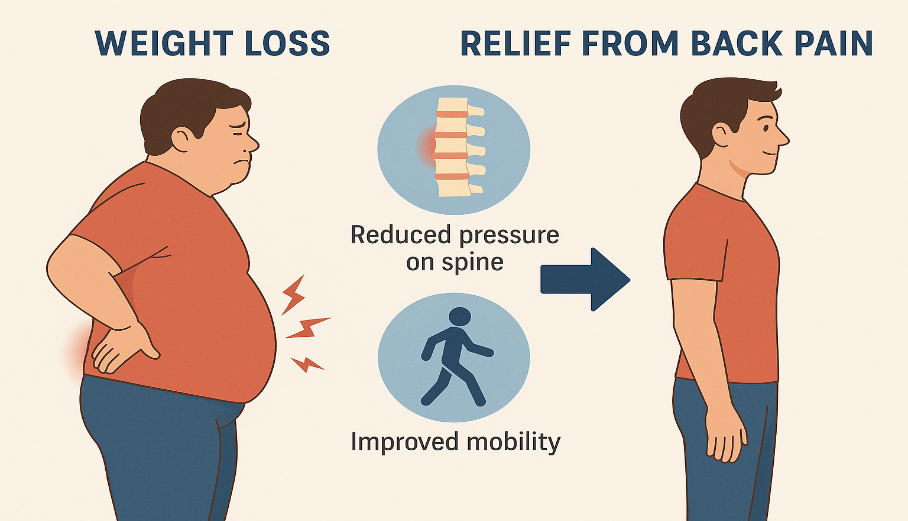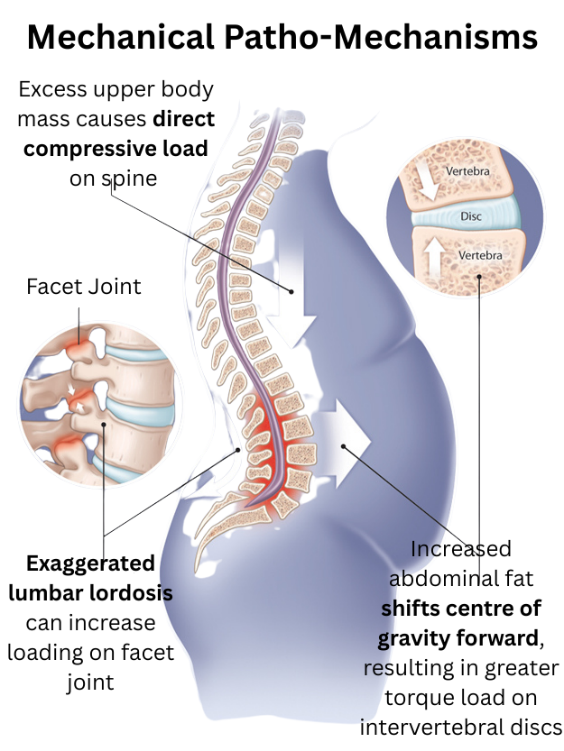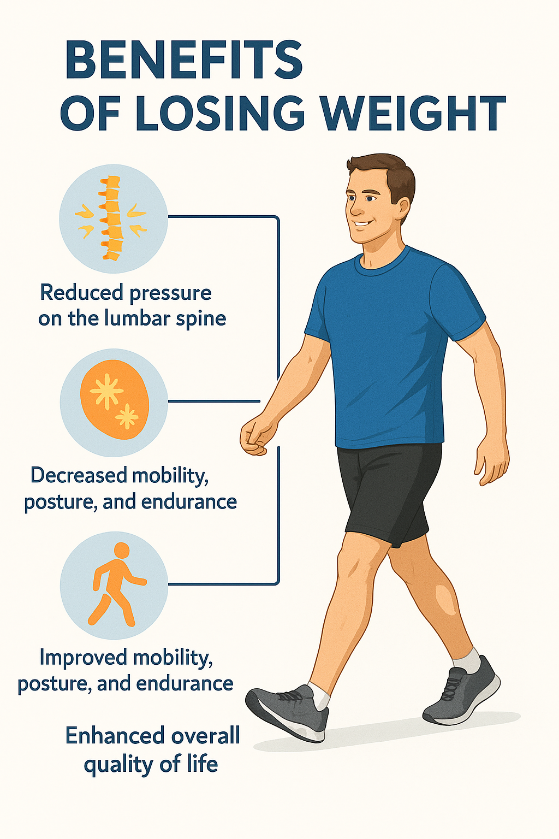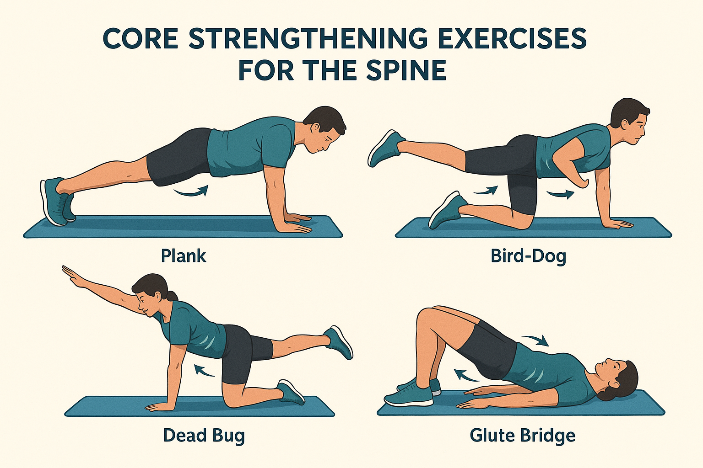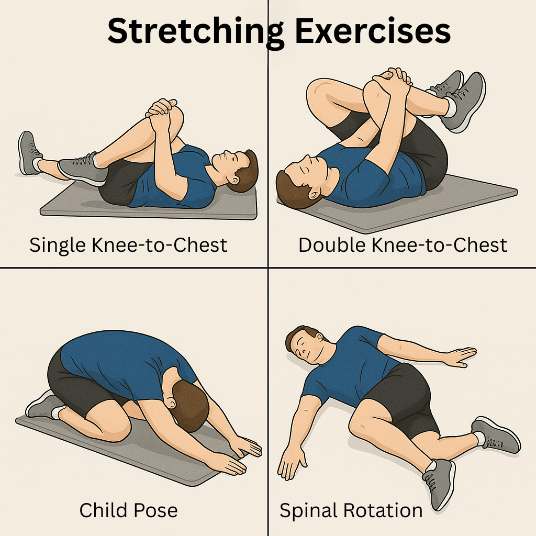Back pain is one of the most common musculoskeletal complaints worldwide, affecting individuals across all age groups. Can weight loss help back pain? While there are many contributing factors, excess body weight is a well-recognized risk factor that can intensify or even cause chronic back pain. In such cases, a holistic approach to pain management—involving physiotherapy, weight management, and lifestyle modifications—can be highly effective.
How Excess Weight Contributes to Back Pain:
1. Increased Mechanical Load:
Carrying extra weight, especially around the abdomen, places greater mechanical stress on the spine and surrounding structures. This added pressure can:
- Accelerate intervertebral disc degeneration
- Increase the risk of spinal misalignment
Strain the muscles and ligaments that support the spine.
2. Postural Alterations:
Obesity often leads to poor posture, such as an increased lumbar lordosis (exaggerated inward curve of the lower back), which further stresses the lower spine and can result in chronic discomfort.
3. Systemic Inflammation:
Fat tissue is metabolically active and produces inflammatory chemicals (cytokines). These contribute to a heightened pain response and may worsen conditions such as degenerative disc disease or arthritis.
Benefits of Weight Loss for Back Pain:
Even a modest reduction in body weight (5-10% of total body mass) can result in significant improvements, including:
- Reduced pressure on the lumbar spine
- Decreased inflammatory markers
- Improved mobility, posture, and endurance
- Enhanced overall quality of life
Role of a Physiotherapist in a Holistic Pain Management Plan:
A physiotherapist is uniquely positioned to guide patients through a safe, structured, and personalized plan to address both weight and spinal health.
1. Comprehensive Assessment:
The physiotherapist begins with a detailed evaluation of:
- Postural alignment
- Gait and movement patterns
- Muscle imbalances
- Spinal mobility and core strength
This assessment informs the development of a tailored treatment plan.
2. Safe and Effective Exercise Prescription:
Exercise is a cornerstone of both pain relief and weight management. Physiotherapists design individualized, low-impact programs that are safe for people experiencing back pain:
- Core strengthening exercises (to stabilize the spine)
- Stretching routines(to reduce tightness in the hamstrings, hip flexors, and lower back)
- Aerobic exercises(e.g., walking, cycling, water-based workouts) to support weight loss
3. Postural and Movement Training:
Many patients unknowingly adopt harmful movement patterns. Physiotherapists educate them on:
- Ergonomic principles (for sitting, lifting, and sleeping)
- Functional training for everyday tasks
- Proper body mechanics to avoid re-injury
4. Pain Management Modalities:
To support the recovery process, physiotherapists may use techniques such as:
- Manual therapy (joint mobilizations, soft tissue techniques)
- Therapeutic ultrasound or TENS
- Dry needling or kinesiology taping
- These interventions help reduce pain and inflammation, making it easier to stay active and committed to a long-term plan.
5. Lifestyle and Behavioral Support:
Physiotherapists often work as part of a multidisciplinary team, collaborating with:
- Dietitians for nutritional guidance
- Psychologists for behavioral therapy or chronic pain coping strategies
- Medical doctors for managing coexisting conditions
They also coach patients in goal-setting, activity pacing, and adherence strategies to promote sustainable changes.
A Sample Holistic Plan for Weight-Related Back Pain:
| Component | Description |
| Physiotherapy | Movement therapy, posture correction, core strengthening |
| Nutrition | Calorie-controlled, anti-inflammatory diet (under dietitian guidance) |
| Mental Health | Mindfulness, CBT, or stress management strategies |
| Medical Support | Monitoring of comorbidities such as diabetes or hypertension |
| Lifestyle Coaching | Regular activity planning, sleep hygiene, behavioral goal tracking |
Conclusion:
Weight management is a key factor in reducing back pain and preventing its recurrence. However, it must be approached safely, especially when pain is already present. Physiotherapists play a pivotal role in this process by addressing the physical, educational, and motivational aspects of recovery. Through a holistic, patient-centered approach, physiotherapy supports both weight loss and spinal health, leading to long-term improvement in function and well-being.
About Authors
Dr. Muhammad Mahmood Ahmad is a Spinal as well as an Orthopedic Surgeon with over 14 years of experience currently practicing at Razia Saeed Hospital, Multan.


